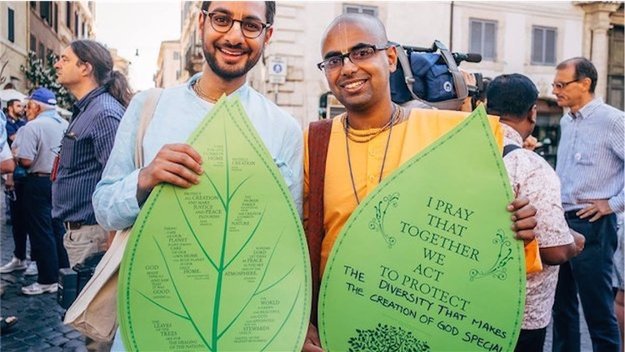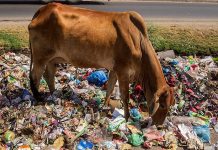
by Madhava Smullen
ISKCON has signed the Hindu Declaration on Climate Change issued on November 23rd, showing its support along with 60 other Hindu leaders and organizations.
The Declaration was put together by the Bhumi Project at the Oxford Centre for Hindu Studies, both of which count ISKCON devotees amongst their staff.
Partnering with them on the project was the Hindu American Foundation, the interfaith environmental organization GreenFaith, and the interfaith campaign for climate action Our Voices.
The Hindu Declaration follows similar documents issued this year by Islamic, Christian and Buddhist leaders.
It describes how global temperatures are increasing, sea levels rising, and ice in the Arctic and Antarctic rapidly melting.
“Climate change is a stark symptom of the deeper problem of humanity living out of balance with what Bhumi Devi, our shared planet, can renewably provide,” it says.
It quotes the Sri Isopanisad, “Isavasyam idam sarvam,” meaning, “This entire universe is to be looked upon as the energy of the Lord.” And the Srimad Bhagavatam (11.2.41): “Ether, air, fire, water, earth, planets, all creatures, directions, trees and plants, rivers and seas, they are all organs of God’s body. Remembering this a devotee respects all species.”
The Declaration then asks the world’s 900 million Hindus to transition to using clean energy, adopt a plant-based diet, and lead lives in harmony with the natural world.
It also calls for strong, meaningful action from the 195 governments currently meeting in Paris from November 30th to December 11th at COP 21 (the 21st Conference of Contracting Parties to the UN Framework Convention on Climate Change).
The Hindu Declaration has been circulated through press releases and online UN newsrooms, while Christiana Figures, the executive secretary of the UN Framework Convention on Climate Change, tweeted it to her 74,000 Twitter followers.
“By signing the Declaration, ISKCON is showing that it is working with the global Hindu community and all the other faith groups on climate change,” says Bhumi Project Director Gopal-Lila Das. “It’s also showing that it is concerned about what comes out of COP21.”
Gopal-Lila is currently at COP21, where delegates from 195 countries are presenting the cuts they’ve agreed to make on greenhouse gas emissions, the environmental projects their countries are planning, and how they envision making it all happen.
With the previous international climate change conference – 2009’s COP15 in Denmark – ending in failure with no legal agreements or formal commitments made, COP21 is being called the planet’s last, best hope to stave off the worst consequences of climate change.
“Never have the stakes of an international meeting been so high, since what is at stake is the future of the planet, the future of life,” President François Hollande of France told a packed United Nations plenary session at a convention center in the Le Bourget suburb north of Paris.
To be a success, the meetings need to end with all the countries collectively committing to reduce greenhouse gas emissions enough to keep global average temperatures from rising more than 2 degrees Celsius over preindustrial temperatures.
For his part, Gopal-Lila is broadcasting podcasts with Our Voices daily from COP21, highlighting the role that faith communities can play in addressing climate change.
“Faith is not a silver bullet – we can’t solve this problem with religious organizations alone,” he says. “But people are moved to action by different things: some by politics, or science, or money; and many, especially in the developing world, are moved to action by morality and religion. So that’s where religious communities come in – they can help by giving the moral argument for why addressing climate change is important.”
As far as ISKCON is concerned, Gopal-Lila explains that because the environment is “the religion of the day,” conscious, concerned global citizens will want to know what religious institutions are doing to address climate change.
“It’s important for ISKCON to not only have the philosophy about caring for the earth, but to also put its money where its mouth is and actively start caring for the planet in line with its own tradition and teachings,” he says.
That active care starts not with some vague, impersonal ISKCON “they,” but with each individual devotee that makes up ISKCON.
“If your local temple is still using Styrofoam plates, you can take your own plate to the Sunday Feast and encourage your friends to do the same,” says Gopal-Lila. “If the temple isn’t using organic milk, you can get a group of devotees together to lobby for milk from protected cows. If the temple’s festivals are not environmentally friendly, and leave piles of garbage behind the temple, you can get involved and change that. And if you’re passionate about recycling, or solar energy, and your temple doesn’t have a recycling scheme or solar system, you can look into how to install one yourself.”
It’s an area Gopal-Lila is clear on. “I think ISKCON devotees need to stop waiting for the leadership of their temples and communities to act, and take personal initiative themselves,” he says.
Click here to read the text of the Hindu Declaration on Climate Change: http://www.hinduclimatedeclaration2015.org/english










